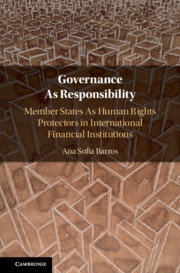 Governance As Responsibility
Governance As Responsibility Published online by Cambridge University Press: 28 June 2019
Chapter III explores the terms in which international human rights law governs the conduct of Executive Directors as member State representatives in international financial institutions and how their responsibility may ultimately be engaged in case of human rights violations. Inspired by rule of law requirements of legality, and the constitutional values of representation and responsiveness, the first part of the chapter examines how these elements have been incorporated in the human rights regime. The notion that member States have a due diligence duty to ensure that human rights are respected and protected throughout institutional operations is analysed in two particular instances, notably, in their role as participants in institutional decision-making, as well as creators of the organisation’s structure and operational framework. The final part of the Chapter examines how member States’ failure to act diligently brings about their international responsibility. It thus analyses the various elements that define the determination of wrongfulness, as well as the provision of remedies to victims. In so doing, it addresses questions such as that of standing, of causality, and the division of reparation duties among multiple member States and the international financial institution.
To save this book to your Kindle, first ensure no-reply@cambridge.org is added to your Approved Personal Document E-mail List under your Personal Document Settings on the Manage Your Content and Devices page of your Amazon account. Then enter the ‘name’ part of your Kindle email address below. Find out more about saving to your Kindle.
Note you can select to save to either the @free.kindle.com or @kindle.com variations. ‘@free.kindle.com’ emails are free but can only be saved to your device when it is connected to wi-fi. ‘@kindle.com’ emails can be delivered even when you are not connected to wi-fi, but note that service fees apply.
Find out more about the Kindle Personal Document Service.
To save content items to your account, please confirm that you agree to abide by our usage policies. If this is the first time you use this feature, you will be asked to authorise Cambridge Core to connect with your account. Find out more about saving content to Dropbox.
To save content items to your account, please confirm that you agree to abide by our usage policies. If this is the first time you use this feature, you will be asked to authorise Cambridge Core to connect with your account. Find out more about saving content to Google Drive.